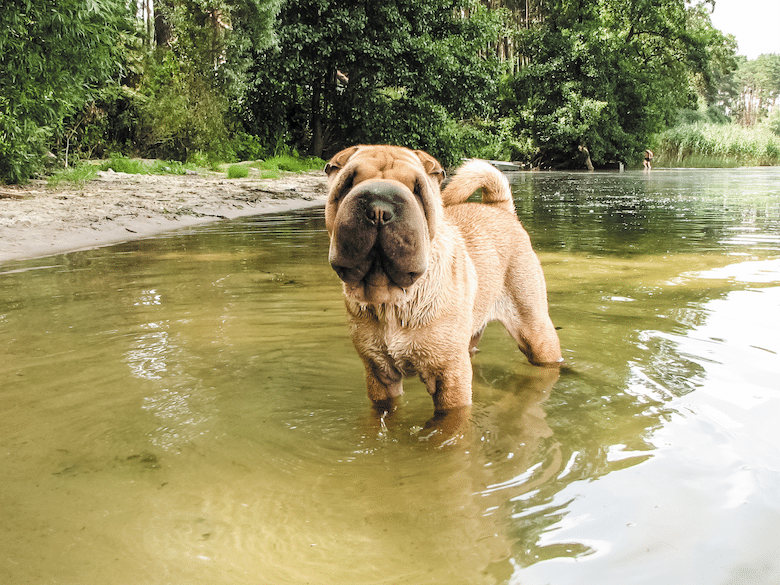The post Why Do Dogs Stink When Wet? by Martha M. Everett appeared first on Dogster. Copying over entire articles infringes on copyright laws. You may not be aware of it, but all of these articles were assigned, contracted and paid for, so they aren't considered public domain. However, we appreciate that you like the article and would love it if you continued sharing just the first paragraph of an article, then linking out to the rest of the piece on Dogster.com.
It’s counterintuitive: You give your dog a bath, and he comes out smelling worse. Why do dogs stink when they’re wet? The answer is pretty gross: The pungent scent is triggered by the excrement of living microbes on your dog.
“The smell on the skin of dogs is a result of normal microorganisms that live on the healthy skin and hair of dogs,” says Jennifer Schissler, DVM, assistant professor of dermatology at Colorado State University’s Veterinary Teaching Hospital in Fort Collins. “These organisms produce volatile chemical byproducts. When your dog gets wet and as she dries, evaporation ensues and releases these volatile compounds into the air so you can smell them more readily.”
The waste from these microorganisms (bacteria and fungi, such as yeast) has little or no scent when dry. But when water dislodges the acrid organic compounds, one whiff of that wafting stench assaults our olfactory senses like, well, critter dung.
Related: So Apparently Dogs and People Share the Same Kinds of Bacteria
Bacteria and yeast thrive in dark, moist, warm conditions, like those under a dog’s fur, so all dogs have some malodor when wet. While unpleasant to us, dogs like stinky things, so the funk probably doesn’t bother them (and may even attract them). And the aroma is not considered harmful to your dog or you.
Fungus among us
There are anywhere from 350 to 16,500 bacteria per square centimeter of dog. That sounds unhealthy, but it’s actually normal.
“All healthy dogs have microorganisms on their skin, which is why even dogs with a very healthy coat and who are quite clean still produce the distinctive wet-dog smell,“ says Dr. Schissler, a diplomate of the American College of Veterinary Dermatology (ACVD).
Before you start thinking your dog is a walking Petri dish, consider that about 100 trillion microbes live on and in the human body (collectively they’re called the microbiome). The human microbiome can weigh as much as 5 pounds, and humans shed 38 million bacteria every hour.
We can never completely eliminate microbes from our dog’s skin — and we shouldn’t, says Christine Cain, DVM, assistant professor of dermatology at the University of Pennsylvania School of Veterinary Medicine in Philadelphia. In this case, warm and fuzzy — the very attributes that make a dog an attractive host for microorganisms — is a different kind of feel-good story: That bastion of bugs helps keep the skin healthy.
“There are several studies looking at the bacterial population of the skin and how this shifts with certain diseases,” says Dr. Cain, an ACVD diplomate. “It highlights that the diverse population of microbes on the skin may serve a protective purpose and that shifts in these microbes may have a role in disease promotion.”

Who’s the stinkiest? Double-coated breeds, such as the Shetland Sheepdog (long, thick fur takes more time to dry). Dogs with prominent skin folds, such as the Chinese Shar-Pei (bacteria and yeast thrive in poorly ventilated areas) Dogs who drool, such as the Bloodhound (moisture trapped in hair and skin creates a microbe breeding ground)
Sink the stink
“I don’t think there is an effective way to completely prevent or eliminate dog odor,” Dr. Cain says.
But there are canine products — both over the counter and prescription — that can decrease or mask odor. They include scented shampoos, conditioners, sprays and spot-ons, some of which contain botanical extracts, essential oils and essential fatty acids.
Regularly brushing your dog and keeping his fur trimmed help speed drying time and prevent odor and dirt from becoming trapped. And always dry a wet dog as thoroughly as possible.
Spring’s arrival brings outdoor play and gardening, so be vigilant about keeping your dog away from feces and manure; contact with them leads to more bacteria on the skin (and bacteria is the main reason stools smell).
Related: Wondering How Often to Bathe a Dog? It Depends on These Factors
Bottom line: “If your dog has wet hair, expect the doggie smell, as all dogs normally have microorganisms in their coats,” Dr. Schissler says.
I told you it was gross. But at least now you know that wet-dog smell is universal and not unhealthy. And it’s not your fault — or your dog’s. You can’t get around bathing your dog, and now that you know there are living organisms crawling all over his skin, you probably want to. Right after you bathe yourself.
Top photograph: Holly Hildreth
Read Next: Why do dogs howl?
The post Why Do Dogs Stink When Wet? by Martha M. Everett appeared first on Dogster. Copying over entire articles infringes on copyright laws. You may not be aware of it, but all of these articles were assigned, contracted and paid for, so they aren't considered public domain. However, we appreciate that you like the article and would love it if you continued sharing just the first paragraph of an article, then linking out to the rest of the piece on Dogster.com.
Poop4U Blog
via www.Poop4U.com
Martha M. Everett, Khareem Sudlow


No comments: